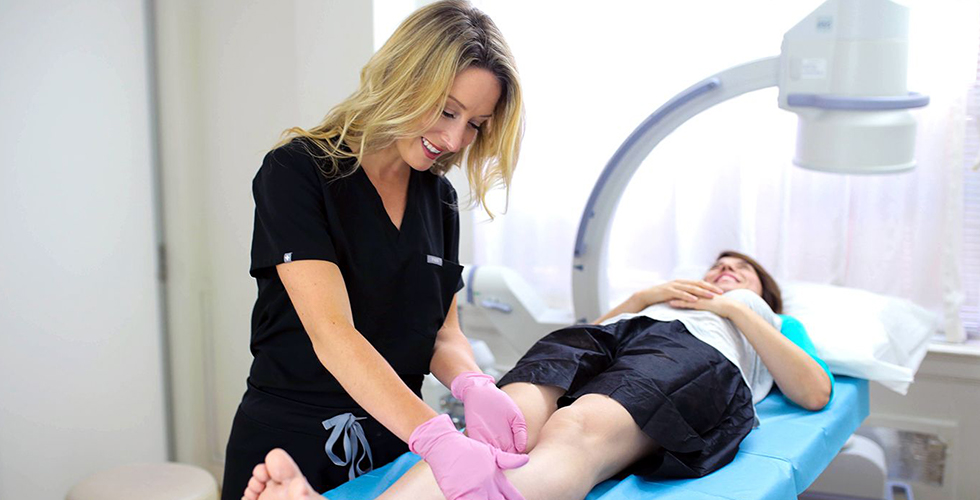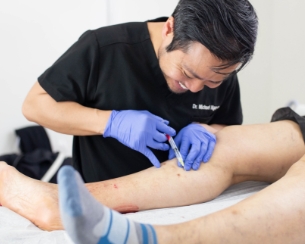How long does it take to recover from vein ablation?
Endovenous ablation is widely considered the most reliable and effective treatment for chronic venous insufficiency, the root cause of all vein problems, including spider veins and varicose veins. During endovenous ablation, the vein doctor makes a small incision on the skin’s surface to insert a catheter and deliver thermal or laser energy into the diseased vein. The diseased vein collapses and gets absorbed by the body, and the accumulated blood reroutes into healthier leg veins.

Vein ablation is a minimally invasive procedure that concludes within an hour and involves no downtime. You may experience mild post-treatment redness, swelling, irritation, leg pain, and bruising around the treatment sites, but there are no major side effects. You can resume your daily activities and work immediately after vein ablation. As such, vein ablation doesn’t involve an extended recovery period, but the mild side effects may dissipate within a few days.
What can you not do after vein ablation?
You can resume most of your daily activities and work after vein ablation — no professional or social downtime. But you should avoid strenuous physical activities, such as biking, running, weight lifting, cycling, or other activities that may place pressure on your leg veins. You should also avoid standing or sitting still for long periods. If you have a desk job, take short breaks to walk around after every 30 minutes or so.

Can I walk after vein ablation?
You can start walking immediately after your vein ablation. In fact, your vein doctor will advise you to walk frequently because that will maintain proper blood circulation and prevent blood from accumulating in your leg veins. You should walk for at least 30 minutes a day after your vein ablation and other vein treatments.
How long will the leg be sore after vein ablation?
You may experience mild leg pain and soreness for a few days after your vein ablation. The specific duration of soreness varies from one individual to the next, depending on your lifestyle and healing capacity. The soreness may only last a few days, or it may last for up to 2 weeks. Your vein doctor may recommend pain medication to alleviate discomfort.
How painful is vein ablation?
Vein ablation is a minimally invasive and painless procedure for chronic venous insufficiency. The vein doctor will administer local anesthesia before making an incision, so you won’t feel any pain — only gentle pressure on your skin. After guiding the catheter into the diseased vein, the vein expert will again deliver tumescent anesthesia to numb the surrounding tissues, ensuring optimal comfort. The vein ablation treatment is painless. After the treatment, you may experience mild post-treatment discomfort and swelling.
Should I elevate my leg after vein ablation?
Yes, you should definitely elevate your legs above your heart’s level after vein ablation. When you elevate your legs, gravity forces the accumulated blood to flow towards the heart, and it prevents blood from accumulating in leg veins. You should elevate your legs for 5 to 10 minutes at a time about 3 times a day and for a total of one week. This will alleviate post-treatment swelling and discomfort, and it will minimize the risk of complications.
Does vein ablation help circulation?
Yes, vein ablation definitely improves blood circulation because it treats the root cause of your vein problems — chronic venous insufficiency. Vein ablation is meant for patients with venous insufficiency, a chronic condition wherein the collapse of vein valves leads to the accumulation of blood in leg veins. Vein ablation destroys the dysfunctional vein and allows the accumulated blood to flow into healthier leg veins, thereby restoring optimal blood circulation to the heart.
How long do you wear compression stockings after vein ablation?
Compression stockings are skin-tight garments that apply pressure on your leg veins, encouraging the accumulated blood to flow towards the heart. After vein ablation, you will be asked to wear compression stockings for up to four weeks. You will have to wear compression stockings throughout the day for the first couple of days after your treatment, but you can gradually reduce the usage to a few hours a day. Your vein doctor will provide a guideline for your compression stocking usage.
What are the side effects of vein ablation?
The most common side effects of vein ablation are redness, swelling, tenderness, discomfort, and bruising around the treatment areas. Some patients experience mild skin discoloration, but that’s rare. And in extremely rare cases, you may also experience nerve injury, infections, skin burns, or deep vein thrombosis. But our vein doctors take all precautions necessary to avoid the rare complications or vein ablation. We maintain a perfect track record with vein treatments — no complications or harsh side effects.
How do you feel after vein ablation?
Most patients don’t experience significant pain and discomfort after vein ablation. You might feel a little tenderness and tightening sensation in your legs for a few days after your procedure. You may also experience mild cramping, bruising, and swelling, but you can manage these sensations with ice packs and pain medications.
How do you prevent blood clots after an ablation?
Deep vein thrombosis, i.e., blood clots in leg veins, is one of the most dangerous (and rarest) potential complications of vein ablation. To minimize the risk of blood clots after vein ablation, you should take frequent walks, exercise regularly, and elevate your legs above your heart’s level while sitting down. You should also wear compression stockings to push accumulated blood towards the heart.
Is vein ablation permanent?
Vein ablation essentially destroys the diseased saphenous vein responsible for your vein problems, rerouting the accumulated blood into healthier leg veins. Once the diseased vein is removed, it can’t return. As such, vein ablation is permanent and produces lifelong results. You can still get vein disease after the treatment, but the same vein won’t return.








